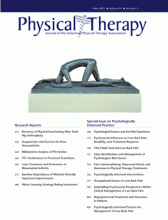Abstract
Background The delivery of acupuncture alongside mainstream interventions and the cost-effectiveness of “alternative” treatments remain areas of controversy.
Objective The aim of this study was to assess the cost-utility of adding acupuncture to a course of advice and exercise delivered by UK National Health Service (NHS) physical therapists to people with osteoarthritis of the knee.
Design A cost-utility analysis was performed alongside a randomized controlled trial.
Methods A total of 352 adults (aged 50 years or older) were randomly assigned to receive 1 of 3 interventions. The primary analysis focused on participants receiving advice and exercise (AE) or advice and exercise plus true acupuncture (AE+TA). A secondary analysis considered participants receiving advice and exercise plus nonpenetrating acupuncture (AE+NPA). The main outcome measures were quality-adjusted life years (QALYs), measured by the EQ-5D, and UK NHS costs. Results were expressed as the incremental cost per QALY gained over 12 months. Sensitivity analyses included a broader cost perspective to incorporate private out-of-pocket costs.
Results NHS costs were higher for AE+TA (£314 [British pounds sterling]) than for AE alone (£229), and the difference in mean QALYs favored AE+TA (mean difference=0.022). The base-case cost per QALY gained was £3,889; this value was associated with a 77% probability that AE+TA would be more cost-effective than AE at a threshold of £20,000 per QALY. Cost-utility data for AE+NPA provided cost-effectiveness estimates similar to those for AE+TA.
Limitations As with all trial-based economic evaluations, caution should be exercised when generalizing results beyond the study perspectives.
Conclusions A package of AE+TA delivered by NHS physical therapists provided a cost-effective use of health care resources despite an associated increase in costs. However, the economic benefits could not be attributed to the penetrating nature of conventional acupuncture; therefore, further research regarding the mechanisms of acupuncture is needed. An analysis of alternative cost perspectives suggested that the results are generalizable to other health care settings.
Footnotes
Dr Whitehurst and Professor Foster provided concept/idea/research design. Dr Whitehurst, Professor Bryan, and Professor Foster provided writing. Dr Thomas and Ms Young provided data collection. Dr Whitehurst, Professor Bryan, and Dr Thomas provided data analysis. Professor Hay, Dr Thomas, and Professor Foster provided project management. Professor Hay and Professor Foster provided fund procurement and facilities/equipment. Professor Hay, Ms Young, and Professor Foster provided institutional liaisons. All authors provided consultation (including review of manuscript before submission).
The authors thank the patients and physical therapists involved in this study. They also acknowledge their colleagues at the Arthritis Research UK Primary Care Centre (Keele University) and the Health Economics Unit (University of Birmingham), particularly Professor Jo Coast, for their comments.
This study was approved by the West Midlands Multicentre Research Ethics Committee (UK) and by 13 local ethics committees.
An oral presentation of data from this study was given at the Chartered Society of Physiotherapy Congress; October 16–17, 2009; Liverpool, United Kingdom. A poster presentation of data from this study was given at the British Society for Rheumatology Annual Meeting/British Health Professionals in Rheumatology Spring Meeting; April 28–May 1, 2009; Glasgow, United Kingdom. Professor Foster also was invited to give an oral presentation at the British Medical Acupuncture Society Conference in October 30, 2010.
This article reports the results of a cost-utility analysis performed alongside a clinical trial. The clinical trial was supported by Project Grant H0640 from Arthritis Research UK and Support for Science funding secured by the North Staffordshire Primary Care Research Consortium for NHS service support costs. Professor Foster was funded by a Primary Care Career Scientist Award from the Department of Health and NHS research and development (UK).
- Received July 22, 2010.
- Accepted December 28, 2010.












